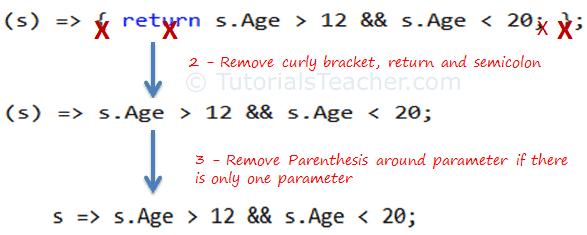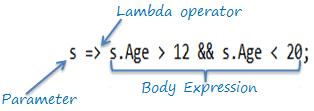Anatomy of the Lambda Expression
C# 3.0(.NET 3.5) introduced the lambda expression along with LINQ. The lambda expression is a shorter way of representing anonymous method using some special syntax.
For example, following anonymous method checks if student is teenager or not:
delegate(Student s) { return s.Age > 12 && s.Age < 20; };Dim isStudentTeenAger = Function(s As Student) As Boolean
Return s.Age > 12 And s.Age < 20
End FunctionThe above anonymous method can be represented using a Lambda Expression in C# and VB.Net as below:
s => s.Age > 12 && s.Age < 20Function(s) s.Age > 12 And s.Age < 20Let's see how the lambda expression evolved from the following anonymous method.
delegate(Student s) { return s.Age > 12 && s.Age < 20; };The Lambda expression evolves from anonymous method by first removing the delegate keyword and parameter type and adding a lambda operator =>.

The above lambda expression is absolutely valid, but we don't need the curly braces, return and semicolon if we have only one statement that returns a value. So we can eliminate it.
Also, we can remove parenthesis (), if we have only one parameter.

Thus, we got the lambda expression: s => s.Age > 12 && s.Age < 20 where s is a parameter, => is the lambda operator and s.Age > 12 && s.Age < 20 is the body expression:

Same way we got lambda expression in VB.Net can be written as below:

The lambda expression can be invoked same way as delegate using ().
VB.Net doesn't support lambda operator =>
Lambda Expression with Multiple Parameters
You can wrap the parameters in parenthesis if you need to pass more than one parameter, as below:
(s, youngAge) => s.Age >= youngAge;You can also give type of each parameters if parameters are confusing:
<b>(Student s,int youngAge)</b> => s.Age >= youngage;Function(s, youngAge) s.Age >= youngAgeLambda Expression without Parameter
It is not necessary to have atleast one parameter in a lambda expression. The lambda expression can be specify without any parameter also.
<b>()</b> => Console.WriteLine("Parameter less lambda expression")Multiple Statements in Lambda Expression Body
You can wrap expressions in curly braces if you want to have more than one statement in the body:
(s, youngAge) =>
<b>{</b>
Console.WriteLine("Lambda expression with multiple statements in the body");
Return s.Age >= youngAge;
<b>}</b>Function(s , youngAge)
Console.WriteLine("Lambda expression with multiple statements in the body")
Return s.Age >= youngAge
End FunctionDeclare Local Variable in Lambda Expression Body
You can declare a variable in the expression body to use it anywhere in the expression body, as below:
s =>
{
int youngAge = 18;
Console.WriteLine("Lambda expression with multiple statements in the body");
return s.Age >= youngAge;
}Function(s)
Dim youngAge As Integer = 18
Console.WriteLine("Lambda expression with multiple statements in the body")
Return s.Age >= youngAge
End FunctionLambda expression can also be assigned to built-in delegates such as Func, Action and Predicate.
Assign Lambda Expression to Delegate
The lambda expression can be assigned to Func<in T, out TResult> type delegate. The last parameter type in a Func delegate is the return type and rest are input parameters. Visit Func delegate section of C# tutorials to know more about it.
Consider the following lambda expression to find out whether a student is a teenager or not.
Func<Student, bool> isStudentTeenAger = s => s.age > 12 && s.age < 20;
Student std = new Student() { age = 21 };
bool isTeen = isStudentTeenAger(std);// returns falseDim isStudentTeenAger As Func(Of Student, Boolean) = Function(s) s.Age > 12 And s.Age < 20
Dim stud As New Student With {.Age = 21}
Dim isTeen As Boolean = isStudentTeenAger(stud) // returns falseIn the above example, the Func delegate expects the first input parameter to be of Student type and the return type to be boolean. The lambda expression s => s.age > 12 && s.age < 20 satisfies the Func<Student, bool> delegate requirement, as shown below:

The Func<> delegate shown above, would turn out to be a function as shown below.
bool isStudentTeenAger(Student s)
{
return s.Age > 12 && s.Age < 20;
}Action Delegate
Unlike the Func delegate, an Action delegate can only have input parameters. Use the Action delegate type when you don't need to return any value from lambda expression.
Action<Student> PrintStudentDetail = s => Console.WriteLine("Name: {0}, Age: {1} ", s.StudentName, s.Age);
Student std = new Student(){ StudentName = "Bill", Age=21};
PrintStudentDetail(std);//output: Name: Bill, Age: 21Dim printStudentDetail As Action(Of Student) = Sub(s) Console.WriteLine("Name: {0}, Age: {1} ", s.StudentName, s.Age)
Dim stud As New Student With {.StudentName = "Bill", .Age = 21}
printStudentDetail(stud)//output: Name: Bill, Age: 21Lambda Expression in LINQ Query
Usually lambda expression is used with LINQ query. Enumerable static class includes Where extension method for IEnumerable<T> that accepts Func<TSource,bool>. So, the Where() extension method for IEnumerable<Student> collection is required to pass Func<Student,bool>, as shown below:

So now, you can pass the lambda expression assigned to the Func delegate to the Where() extension method in the method syntax as shown below:
IList<Student> studentList = new List<Student>(){...};
Func<Student, bool> isStudentTeenAger = s => s.age > 12 && s.age < 20;
var teenStudents = studentList.Where(isStudentTeenAger).ToList<Student>();IList<Student> studentList = new List<Student>(){...};
Func<Student, bool> isStudentTeenAger = s => s.age > 12 && s.age < 20;
var teenStudents = from s in studentList
where isStudentTeenAger(s)
select s;You can follow the same method in VB.Net to pass Func delegate.